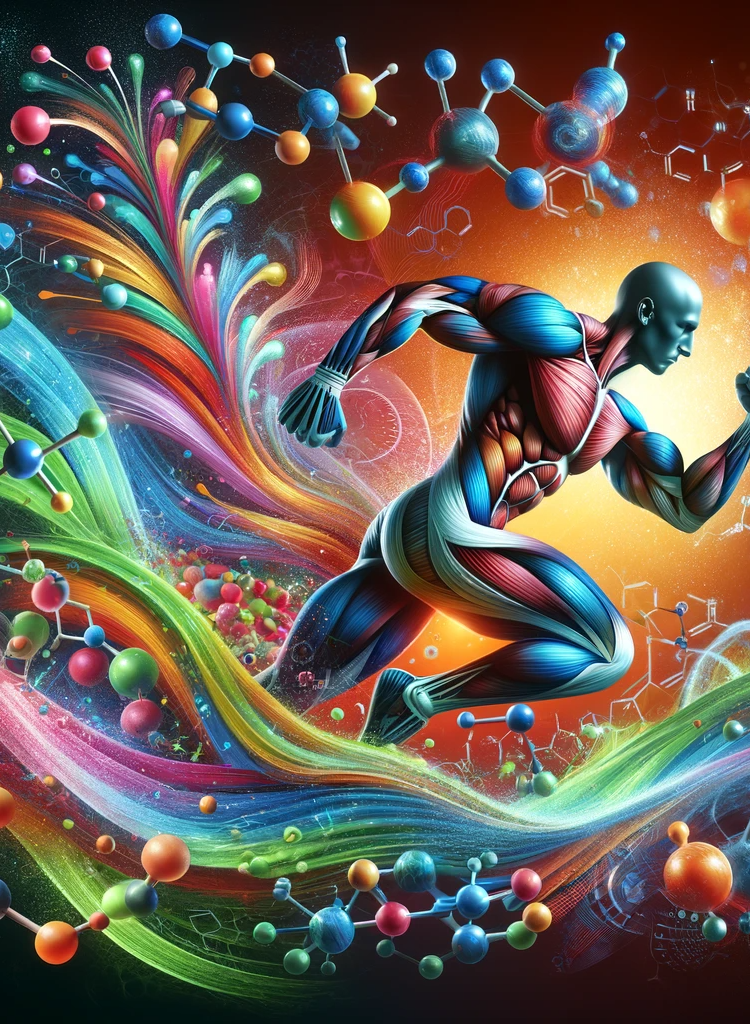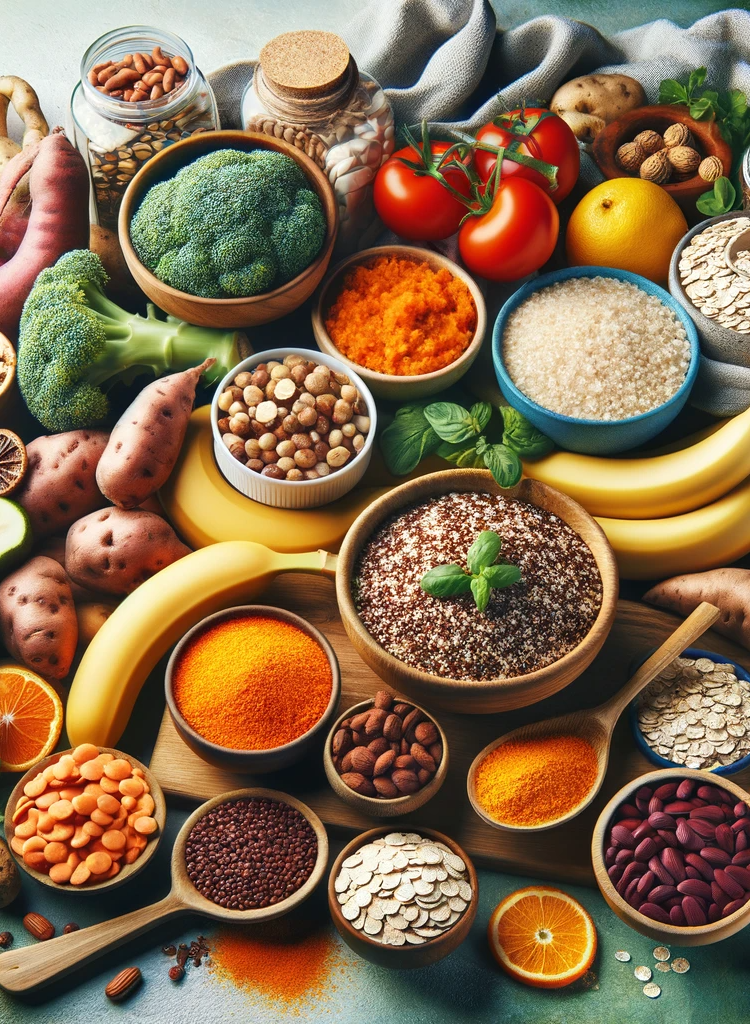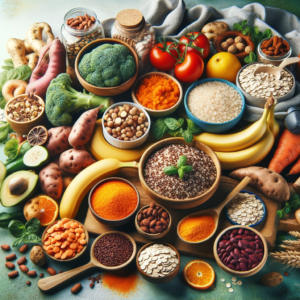Amino acids are essential building blocks for muscle tissue, making them crucial to muscle growth and development. As a vegan athlete, obtaining these essential amino acids can be challenging because they are primarily found in animal-based foods. However, with proper planning and a varied vegan diet, it’s possible to obtain all the necessary amino acids for muscle growth.
In this article, we will explore the role of amino acids in vegan muscle growth, including the different types of amino acids and their importance. We will also provide practical tips on how to optimize amino acid intake and highlight plant-based sources that are rich in essential amino acids.
Key Takeaways:
- Amino acids are essential building blocks for muscle tissue and are crucial for muscle growth and development.
- Vegan athletes may face challenges in obtaining essential amino acids from plant-based sources.
- A balanced combination of amino acids, including essential and branched-chain amino acids (BCAAs), is important for optimal muscle development.
Understanding Amino Acids and Muscle Growth
When it comes to muscle growth, amino acids play a crucial role as the building blocks of protein and muscle tissue. There are 20 different amino acids, nine of which are considered essential, meaning our bodies cannot produce them on their own and need to obtain them through food.
Plant-based sources of protein often lack one or more essential amino acids, which can make it challenging for vegans to consume a balanced combination of amino acids.
However, by consuming a variety of vegan protein sources, it is possible to obtain all the essential amino acids needed to support muscle growth. For example, legumes such as lentils and chickpeas are excellent sources of protein and contain all nine essential amino acids. Other vegan protein sources, such as quinoa, nuts, and seeds, also provide a good balance of amino acids.
Types of Amino Acids
There are several types of amino acids, with branched-chain amino acids (BCAAs) being some of the most important for muscle growth. BCAAs, which include leucine, isoleucine, and valine, make up a significant portion of the amino acids found in muscle tissue and are involved in muscle repair and recovery. Consuming additional BCAAs, either through food or supplements, can help support muscle development.
Overall, to maximize muscle growth as a vegan, it is important to consume a variety of protein-rich plant-based foods and pay attention to the balance of the essential amino acids. Consider incorporating vegan protein supplements or BCAA supplements if needed, and make sure to time meals properly for optimal muscle recovery and protein synthesis.
The Benefits of Plant-Based Muscle Growth
Plant-based diets have become increasingly popular for several health and environmental reasons. Veganism, which is a form of plant-based diet, has gained popularity among athletes and fitness enthusiasts because of its positive impact on muscle growth.
Studies have shown that plant-based diets can significantly improve athletic performance. Furthermore, plant-based diets can provide all the necessary nutrients required for muscle growth, including amino acids, the building blocks of protein that play a fundamental role in muscle development.
But besides supporting muscle growth, plant-based diets also offer other benefits to athletes. For instance, plant-based diets are generally lower in saturated fat and higher in fiber, providing an assortment of health benefits, such as improving cardiovascular health.
In addition, consuming plant-based diets may lower the risk of developing certain health conditions, such as cancer and type 2 diabetes.
Overall, the benefits of plant-based muscle growth extends beyond physical appearance and athletic performance alone. Plant-based diets are a healthy and sustainable way of supporting muscle development while also promoting overall health and well-being.
Optimizing Amino Acid Intake for Vegan Athletes
Consuming adequate amounts of amino acids is crucial for vegan athletes to support muscle growth and recovery. Here are some practical tips to optimize your amino acid intake:
- Vary your protein sources: Consuming a variety of protein-rich foods ensures that you will obtain all essential amino acids. Examples of vegan protein sources that contain essential amino acids include beans, lentils, tofu, tempeh, quinoa, and seitan.
- Combine complementary plant-based proteins: Combining different plant-based protein sources can enhance their amino acid profile. Examples of complementary protein combinations include rice and beans, hummus and whole wheat pita, and tofu and quinoa.
- Time meals properly: Consuming protein-rich foods throughout the day can enhance protein synthesis. Aim to consume protein with every meal and snack, especially post-workout when your body is primed to absorb nutrients.
- Consider post-workout nutrition: Consuming protein and carbohydrates after exercise can aid in muscle recovery and growth. Examples of vegan post-workout snacks include a protein shake with fruit or nuts and seeds with hummus and veggies.
While it is possible to obtain all necessary amino acids from a well-planned vegan diet, some vegan athletes may wish to consider amino acid supplements. Before considering supplements, speak with a registered dietitian to determine if they are necessary for your specific needs.
Vegan Protein Sources Rich in Amino Acids
While some may assume that vegans have a difficult time obtaining adequate protein, there are actually many plant-based sources of protein that are also rich in essential amino acids.
These include:
| Protein Source | Amino Acids |
|---|---|
| Lentils | Lysine, isoleucine, tryptophan, threonine |
| Chickpeas | Lysine, tryptophan, threonine |
| Tofu | Lysine, tryptophan, threonine, leucine, isoleucine, valine |
| Tempeh | Lysine, tryptophan, threonine, leucine, isoleucine, valine |
| Quinoa | Lysine, isoleucine, tryptophan, threonine |
| Black Beans | Lysine, tryptophan, threonine, isoleucine |
| Green Peas | Lysine, leucine, isoleucine, valine |
| Chia Seeds | Leucine, isoleucine, valine, tryptophan, threonine |
| Pumpkin Seeds | Leucine, lysine, tryptophan, threonine, isoleucine |
| Almonds | Leucine, lysine, tryptophan, threonine, isoleucine |
| Spirulina | Leucine, valine, isoleucine, lysine, tryptophan, threonine |
| Hemp Seeds | Leucine, lysine, methionine, isoleucine, tryptophan, threonine |
| Buckwheat | Lysine, leucine, isoleucine, valine, tryptophan, threonine |
| Soy Milk | Lysine, leucine, isoleucine, valine, tryptophan, threonine |
| Seitan (Wheat Meat) | Leucine, lysine, methionine, isoleucine, tryptophan, threonine |
| Oats and Oatmeal | Leucine, lysine, methionine, isoleucine, tryptophan, threonine |
| Brown Rice | Leucine, lysine, methionine, isoleucine, tryptophan, threonine |
| Spinach | Leucine, lysine, methionine, isoleucine, tryptophan, threonine |
| Broccoli | Leucine, lysine, methionine, isoleucine, tryptophan, threonine |
| Sweet Potatoes | Leucine, lysine, methionine, isoleucine, tryptophan, threonine |
| Kale | Leucine, lysine, methionine, isoleucine, tryptophan, threonine |
For those who may struggle to get enough protein or amino acids through their diet alone, there are also vegan protein supplements available that can help fill any nutritional gaps. These supplements can come in the form of powders or bars, and may include ingredients like pea protein, soy protein, and hemp protein.
The Role of BCAAs in Vegan Muscle Growth
Branched-chain amino acids (BCAAs) are a group of three essential amino acids: leucine, isoleucine, and valine. These amino acids have received particular attention in the fitness industry due to their ability to enhance protein synthesis, prevent muscle breakdown during exercise, and accelerate muscle recovery after intense workouts.
For vegans, obtaining sufficient quantities of BCAAs can be challenging, given that they are primarily found in animal-based protein sources like meat, eggs, and dairy. However, several plant-based sources also contain significant amounts of BCAAs, including soybeans, quinoa, and brown rice protein.
It’s important to note that BCAA supplements should not be used as a replacement for a varied and balanced diet, but rather as an addition to ensure adequate intake of essential amino acids. Moreover, while BCAAs have several benefits for muscle growth and recovery, they should be used in moderation, and athletes should consult with a healthcare professional before starting to use them.
The Role of Amino Acids in Muscle Growth Explained
Overcoming Amino Acid Deficiencies on a Vegan Diet
While a well-planned vegan diet can provide all necessary nutrients for optimal muscle development, it is important to ensure adequate consumption of essential amino acids. Some plant-based sources may lack specific amino acids, leading to deficiencies if not balanced through diet and supplementation.
A variety of plant-based protein sources can provide essential amino acids and should be incorporated into a balanced diet. Combining different food groups such as grains and legumes can also help to create complete protein sources. Additionally, fortified foods or supplements may be considered to ensure adequate intake of essential amino acids.
Some of the essential amino acids that may be more challenging for vegans to obtain include lysine, methionine, and tryptophan. However, incorporating vegan protein sources such as quinoa, soy, and hemp seeds can provide all essential amino acids.
Overall, with proper planning and attention to balancing amino acid intake, vegans can meet their protein needs for muscle growth and maintenance.
Meal Planning for Muscle Growth
Meal planning is an essential aspect of muscle growth. To optimize muscle development, it is important to consume a well-balanced diet that includes an adequate combination of plant-based protein sources to ensure a sufficient supply of amino acids.
Here are some tips for creating a meal plan that will support muscle growth:
Vary Protein Sources
To ensure a varied amino acid profile, incorporate a variety of plant-based protein sources into your diet. This includes legumes, tofu, tempeh, quinoa, and other grains. Experimenting with different recipes and cuisines can help you discover new protein sources that will keep your meals interesting and nutritionally diverse.
Complementary Proteins
Combining complementary plant-based proteins ensures that you’re getting all the essential amino acids your body needs. Examples of complementary proteins include rice and beans, hummus and pita bread, and peanut butter on whole-grain bread.
Timing Matters
The timing of meals is also essential for vegan muscle growth. Consuming protein-rich foods within 30 minutes after a workout can help enhance protein synthesis and muscle recovery. Don’t forget to eat a balanced meal at least 2-3 hours before your workout to ensure adequate fuel for the session.
Pre and Post-Workout Snacks
For pre and post-workout snacks, aim for a mix of carbohydrates and protein. Some examples include fruit and nut butter, a protein smoothie, or a protein bar. These snacks will help you fuel your workout and support muscle recovery afterwards.
Adequate Calorie and Protein Intake
Finally, ensure that you’re consuming enough calories and protein to support muscle growth. Use a calorie and macronutrient calculator to determine your daily requirements and track your intake using a food diary or app. If you’re struggling to consume enough protein, consider adding a vegan protein supplement to your diet.
The Role of Rest and Recovery in Muscle Growth
While nutrition plays a critical role in building muscle as a vegan athlete, rest and recovery are equally important. Adequate rest and recovery promote muscle repair and growth, preventing injury and improving performance.
Sleep is one of the most crucial components of rest and recovery. Aim to get at least 7-8 hours of sleep per night to ensure optimal muscle recovery. Additionally, staying hydrated is important for maintaining muscle function and preventing cramps. Drink plenty of water throughout the day, especially during and after workouts.
Stress management is also essential for rest and recovery. Too much stress can lead to muscle tension and hinder muscle growth. Incorporate stress-reducing activities into your routine, such as meditation or yoga.
It’s important to listen to your body and allow for rest days in your workout routine. Overtraining can lead to fatigue, injury, and hinder muscle growth. Incorporate active rest days into your routine, such as light stretching or a leisurely walk.
Tracking Progress and Adjusting Diet
It is important for vegan athletes to track their progress in muscle building and adjust their diet accordingly. By monitoring strength gains, body composition changes, and energy levels, athletes can determine if their current diet is effective or needs to be adjusted. Vegan amino acid supplements can also be considered as a way to support muscle growth, but should only be used after consulting with a healthcare professional.
Overall, a well-planned vegan diet that includes a variety of protein sources can provide all the essential amino acids needed for muscle development. Rest and recovery are also crucial in optimizing muscle growth. Vegan athletes should prioritize adequate sleep, hydration, and stress management to support their athletic performance.
Conclusion
In conclusion, the role of amino acids in vegan muscle growth cannot be overstated. As the building blocks of protein and muscle tissue, essential amino acids are crucial for optimal muscle development. For vegans, obtaining all of the necessary amino acids from plant-based sources may pose a challenge. However, a well-planned vegan diet that includes a variety of protein sources can provide all the essential amino acids needed for muscle building.
Plant-based muscle growth has many benefits, including lower saturated fat intake and increased fiber consumption, which can reduce the risk of certain health conditions. Vegan athletes can optimize their amino acid intake by varying protein sources, combining complementary plant-based proteins, and timing meals properly. Additionally, post-workout nutrition is crucial for muscle recovery and protein synthesis.
FAQ
Q: What are amino acids and why are they important for vegan muscle growth?
A: Amino acids are the building blocks of protein and muscle tissue. They play a crucial role in muscle growth and repair. For vegans, it is important to ensure an adequate intake of essential amino acids from plant-based sources to support muscle development.
Q: Are there any vegan amino acid supplements available?
A: Yes, there are vegan amino acid supplements available in the market. These supplements can help bridge any nutritional gaps and ensure an adequate intake of amino acids for muscle growth. However, it is always recommended to prioritize whole food sources of amino acids and use supplements as a complement if necessary.
Q: How can vegans optimize their amino acid intake for muscle growth?
A: To optimize amino acid intake, vegans can vary their protein sources, combine complementary plant-based proteins (such as rice and beans), and properly time their meals. Additionally, paying attention to post-workout nutrition is important for muscle recovery and protein synthesis.
Q: What are some vegan protein sources that are rich in amino acids?
A: Vegan protein sources that are rich in amino acids include legumes (such as lentils, chickpeas, and black beans), tofu, tempeh, quinoa, nuts, and seeds. These whole foods can provide a complete profile of essential amino acids.
Q: How can vegans overcome amino acid deficiencies on a vegan diet?
A: To overcome amino acid deficiencies, vegans should focus on consuming a variety of plant-based protein sources, combining different food groups, and considering fortified foods or supplements when necessary. It is important to have a well-planned and balanced vegan diet to ensure all essential amino acids are being obtained.



